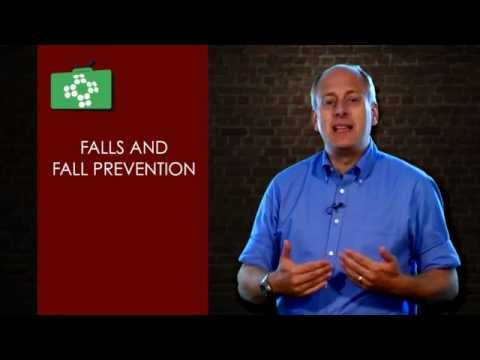Falls and Fall prevention can reduce the number of accidents in the home. Many people are seriously hurt every day in their own home and this can be made worse if they are on their own.There are a few things that you can do to help reduce risk and with a bit of thought you can deal with the emergency should it happen. In this video, we look at the problem and what to do should an accident happen.
Everyone falls from time to time. Injury from falls and slips in the elderly or disabled cannot always be avoided, but the risks can be reduced. Before we look at what to do if you fall, let’s look at what can cause you to fall.
People are at a higher risk of falling if they have had a fall in the past 12 months, balance or ear problems, fear of falling and some mental health problem. Medicines can increase your risk as there may be side effects that cause sight, balance or make you feel dizzy or light headed. Your Doctor or Pharmacist can advise on possible side affects of medicines and the best times to take your medications as some have to be taken with food or at night and taking them at the wrong time may make you feel unwell. Make sure your Doctor reviews your medications at least every 6 months. Ensuring that you eat regularly and a healthy diet as lower sugar levels can cause dizziness. Your Doctors surgery can advise on diet or put you in touch with someone who can help.
Make sure you wear your glasses, hearing aids and make sure your home is well lit so you can see where you are going and hear any possible dangers. You can get free eye tests and hearing tests. There are some opticians that can test your eyes at home. If you have pets make sure you know where they are and if they have toys try to keep them tidy. A dog can leave dribble or urine on a floor and this could cause a slip hazard.
Your footwear is important to reduce slipping and falling. Make sure your footwear is in good condition and the soles are not broken. Shoes should fit correctly and have good grip with effective fastenings to keep them in place. If shoes are not done up or there is a loose shoe lace this can easily trip you. Avoid just wearing socks as these can cause you to slip and you can easily stub your toes if you are wearing socks or bare foot. If you do not have shoes or slippers to wear bare foot is better than just wearing socks as you will have more grip with bare feet.
Clothing can also cause problems as badly fitting cloths that are too long like a dressing found can trip you up as you walk. Loose clothing can also get caught on door handles which will pull you over as well. Loose rugs, mats and damaged carpets can trip you as well as cables or other items on the floor. Take care when going to the toilet especially at night. Make sure you turn lights on and use handles to keep yourself safe.
If you use mobility aids make sure they are in good working order and they have been adjusted in size for you. Walking sticks, crutches and frames must be maintained and have effective rubbers on the end. The rubber should be check daily as sometimes the stick can cut through the rubber and you may push down and be on bare metal rather than the non slip rubber. Your doctor or hospital can advise on where you can go for help and advise.
If you do fall then the first thing to try to do is not panic. Relax and think what you need to do rather than quickly try and get up as you need to know why you have fallen to avoid it happening again. Attempt to get up by rolling on to your hands and knees and crawl to a piece of furniture to pull yourself up. If you are unable to get up get help by using your emergency pendant, shout for help, use call bells or phone someone if possible. If this is not possible try to keep warm and moving as much as you can. Keep hydrated and try to use cushions to be as comfortable as possible until help arrives. If you do pass urine while on the floor try to move away front he wet area and use newspapers or magazines to absorb the fluid.
A lot of what we have covered is common sense but if you do not take care and rush you can easily fall. Make sure you tell someone if you fall or feel dizzy at times so they can get you more help to remove the risk or maybe with medication you can start to feel better.


